|
|
|
Sort Order |
|
|
|
Items / Page
|
|
|
|
|
|
|
| Srl | Item |
| 1 |
ID:
149204
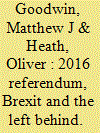

|
|
|
|
|
| Summary/Abstract |
Why did Britain vote for Brexit? What was the relative importance of factors such as education, age, immigration and ethnic diversity? And to what extent did the pattern of public support for Brexit across the country match the pattern of public support in earlier years for eurosceptic parties, notably the UK Independence Party (UKIP)? In this article we draw on aggregate-level data to conduct an initial exploration of the 2016 referendum vote. First, we find that turnout was generally higher in more pro-Leave areas. Second, we find that public support for Leave closely mapped past support for UKIP. And third, we find that support for Leave was more polarised along education lines than support for UKIP ever was. The implication of this finding is that support for euroscepticism has both widened and narrowed—it is now more widespread across Britain but it is also more socially distinctive.
|
|
|
|
|
|
|
|
|
|
|
|
|
|
|
|
| 2 |
ID:
155401
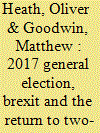

|
|
|
|
|
| Summary/Abstract |
The outcome of the 2017 general election—a hung parliament—defied most predictions. In this article, we draw on aggregate-level data to conduct an initial exploration of the vote. What was the impact of Brexit on the 2017 general election result? What difference did the collapse of UKIP make? And what was the relative importance of factors such as turnout, education, age and ethnic diversity on support for the two main parties? First, we find that turnout was generally higher in more pro-remain areas, and places with high concentrations of young people, ethnic minorities and university graduates. Second, we find that the Conservatives made gains in the sort of places that had previously backed Brexit and previously voted for UKIP. But, third, we find that the gains the Conservatives made from the electoral decline of UKIP were offset by losses in the sort of places that had previously supported the Conservatives, particularly areas in southern England with larger numbers of graduates. The implication of these findings is that while a Brexit effect contributed to a ‘realignment on the right’, with the Conservative strategy appealing to people in places that had previously voted for UKIP, this strategy was not without an electoral cost, and appears to have hurt the party in more middle class areas.
|
|
|
|
|
|
|
|
|
|
|
|
|
|
|
|
| 3 |
ID:
171645
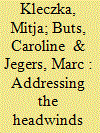

|
|
|
|
|
| Summary/Abstract |
The European arms industry is challenged by several adverse “headwinds.” Fragmentation leads to costly duplications and, in conjunction with stagnating budgets and sharply increasing costs, prevents firms from exploiting economies of scale and learning. This is exacerbated by size differentials vis-a-vis the leading US arms manufacturers and competition from emerging producers. As some “headwinds” are self-enforcing, far-reaching industrial and policy responses are required to improve the industry's outlook. As exports may not indefinitely compensate for low domestic demand, there is an economic imperative for further cross-border collaboration and consolidation. Despite various EU policy initiatives, progresses regarding the European Defence Equipment Market and strengthening the European Defence Technological Industrial Base have been relatively slow. It remains to be seen whether the European Defence Fund will be the proclaimed “game-changer,” raising competitiveness of the European arms industry. At the same time, the UK's withdrawal from the EU adds uncertainties.
|
|
|
|
|
|
|
|
|
|
|
|
|
|
|
|
| 4 |
ID:
152686
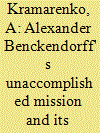

|
|
|
|
|
| Summary/Abstract |
THE ELEVENTH OF JANUARY of this year was the 100th anniversary of the death of the Russian Empire's last ambassador to the United Kingdom, Count Alexander Benckendorff, who is buried inside the Westminster Cathedral in London, the main Catholic church of England and Wales. This anniversary was, in a sense, a reminder of a mission that Benckendorff had in London, where he arrived in 1903, but was unable to fulfill. What was that mission, and why its failure still affects us today?
|
|
|
|
|
|
|
|
|
|
|
|
|
|
|
|
| 5 |
ID:
148303


|
|
|
|
|
| Summary/Abstract |
The public expects European governments and the European Union (EU) to deal with the security challenges in and around Europe. So does the US, whose strategic focus has pivoted to the Pacific. Washington, DC has made it clear that it will not, and cannot, solve all of Europe’s problems. The call for ‘strategic autonomy’ in the new EU Global Strategy of June 2016 does not come a moment too soon. But should the aim be EU strategic autonomy, without the UK, or can the aspiration still be European strategic autonomy, with the UK? Can nothing be achieved unless all are fully involved? Or are intermediate solutions possible? How EU Member States and the UK answer these questions will determine which degree of strategic autonomy the EU can achieve. With which degree of British involvement. And whether the UK itself will be left with any measure of strategic autonomy.
|
|
|
|
|
|
|
|
|
|
|
|
|
|
|
|
| 6 |
ID:
164651


|
|
|
|
|
| Summary/Abstract |
This article demonstrates the role and importance of EU agencies in the EU’s regulatory environment, and considers the consequences of an absence of cooperation through agencies for internal security. It does so by exploring the case study of the anti-counterfeiting activities of the European Union Intellectual Property Office (EUIPO), and what happens when a state no longer benefits from membership of an EU agency. The effective protection of consumers from counterfeit goods is dependent upon identifying best practices, sharing information on counterfeiting trends, and coordinating responses, activities undertaken through EU agencies. This article demonstrates that the ability of states to effectively counter the sale of counterfeit goods is dependent upon the existence of EU agencies due to the need for transnational cooperation. In the absence of EU agencies, states are likely to suffer diminished operational expertise and a lack of in-depth knowledge concerning counterfeiting trends. It concludes that the EU agencies form an essential part of EU security governance, with states not party to these cooperative endeavours rendered vulnerable and unable to combat at a national level what is ultimately a global problem.
|
|
|
|
|
|
|
|
|
|
|
|
|
|
|
|
| 7 |
ID:
145565
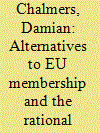

|
|
|
|
|
| Summary/Abstract |
The domestic scenario following a Brexit vote is likely to be characterised by high stakes, uncertainty and fissile political debate. No off-the-peg arrangement touted for Brexit—be it Norwegian, Swiss, Turkish or Canadian—was designed to engage with such a context. Nor does it seem wise to rush to medium-term commitments which might pre-empt democratic politics and wise choices. Far more important will be the legitimacy of any institutional settlement governing this arrangement, which will provide the context for its revision and development and the space for democratic reflection over how these policies are to be governed. It will be suggested that here there is much insight to be gained from looking at regional arrangements beyond the EU.
|
|
|
|
|
|
|
|
|
|
|
|
|
|
|
|
| 8 |
ID:
186196
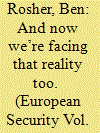

|
|
|
|
|
| Summary/Abstract |
Though conspicuous by its absence in debates among the British political and media establishments during the EU referendum campaign, the Irish border has been the central feature of Brexit as the implications and complications of trying to “take back control of borders” have become apparent. Drawing on focus group data gathered between 2017 and 2019 I employ ontological security theory to investigate the impact that Brexit is having on residents and communities living in the central Irish border region. In particular, I draw on the work of David Carr to explore the social role of memory and narrative in ontological (in)security and how this has manifested in the border region throughout the Brexit process. I find that the uncertainties generated by Brexit have caused border residents to draw on anxiety-filled memories and narratives from the securitised border of the pre-Good Friday Agreement era which they then project onto and vicariously through the next generation who, in turn, embody these anxieties, creating intergenerational ontological insecurity. Brexit has reintroduced, if not the physical border, the psychological borders of the past.
|
|
|
|
|
|
|
|
|
|
|
|
|
|
|
|
| 9 |
ID:
165385
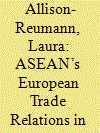

|
|
|
|
|
| Summary/Abstract |
The reaction within Southeast Asia from business and policy leaders to the United Kingdom’s decision to exit the European Union has thus far been one of disappointment rather than panic. How Brexit will affect a possible EU–ASEAN free trade agreement, bilateral trade deals in the region, foreign direct investment flows between ASEAN and the U.K. and the EU, and the U.K.’s future trade arrangements remains uncertain. This article examines how the U.K.’s departure from the Union will affect ASEAN and its member states in terms of European trade, and its impact on the U.K.’s and the EU’s trade relations with Southeast Asia. It is argued that ASEAN is far from being immune to the effects of Brexit on financial markets and trade configurations. However, given the diversity of trade and investment among the ASEAN member states, aggregated regional effects and member-state effects will differ. The findings also suggest that there will be political and security considerations for ASEAN and its member states whilst the U.K. tries to establish itself as an independent trade actor post Brexit.
|
|
|
|
|
|
|
|
|
|
|
|
|
|
|
|
| 10 |
ID:
162510
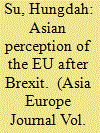

|
|
|
|
|
| Summary/Abstract |
The Brexit was in general interpreted as damage to the EU image abroad. In order to understand this damage and to propose some remedies for the EU public diplomacy in Asia, the authors conducted a media analysis of mainstream newspapers between May and October 2016 and a general survey between July 2016 and February 2017 in Taiwan. Based upon this analysis and survey, the authors intended to give a picture of EU image in Taiwanese media and people’s perception after the Brexit and find out key factors shaping this image. According to them, EU was frequently reported as a reference rather than a focus in Asian media, of which a majority of reports were neither positive nor negative. Brexit did increase visibility of the EU but in a very negative way. In order to remedy this damage and promote EU image in the aftermath of Brexit, the authors proposed two approaches after an in-depth study of all of those news reports and the general survey. It is suggested that EU should continue to strengthen its bilateral relationship with Asian countries and, at the same time, adopt normative actions on the world stage.
|
|
|
|
|
|
|
|
|
|
|
|
|
|
|
|
| 11 |
ID:
159688
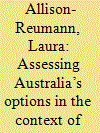

|
|
|
|
|
| Summary/Abstract |
The Brexit vote will fundamentally transform the European Union (EU) and will change how the UK relates to Europe and the rest of the world. What are the implications for Australia at this critical juncture? The UK has been a major player in the Australia–EU relationship, and Australia will now need to recalibrate its approach to both the UK and the EU across a range of policy areas. This article examines the future of Australia–UK and Australia–EU relations in the wake of Brexit, and assesses Australia’s options going forward. The authors advance three considerations. Firstly, Australia’s national interests are best served by adopting a pragmatic rather than nostalgic approach towards future relations with the UK and the EU. Secondly, Australia should avoid pursuing one relationship at the expense of the other and creating a zero-sum dynamic. Finally, Australia’s future strategy must consider broader global developments, such as events within its own region and the US presidency.
|
|
|
|
|
|
|
|
|
|
|
|
|
|
|
|
| 12 |
ID:
156299
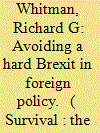

|
|
|
|
|
| Summary/Abstract |
The current public image of the Brexit process is of a British government negotiating with itself while simultaneously making little progress in Article 50 talks with the EU. It is perhaps inevitable that disputes over money, borders, citizens and a future trading relationship should overshadow other areas where the EU and UK could develop an effective post-Brexit partnership. Foreign, security and defence policy are areas where a departure from the existing intertwined relationship between the UK, the EU and the 27 other member states would have mutually detrimental effects.
|
|
|
|
|
|
|
|
|
|
|
|
|
|
|
|
| 13 |
ID:
153442
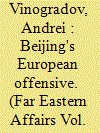

|
|
|
|
|
| Summary/Abstract |
December 11, 2016 marked the 15th anniversary of China becoming a member of the World Trade Organization. According to the Chinese, this date is grounds for automatically granting China the status of a country with a market economy. What has changed in relations between China and the countries of the European Union since that date, and what is behind the European countries' hesitation to grant China this status? How are the results of the referendum in Great Britain influencing relations between China and the European Union? What are the prospects for the European Union and the United States concluding a Transatlantic Partnership trade agreement, and how will China's position in Europe be affected as a result? These questions and others are examined in this work.
|
|
|
|
|
|
|
|
|
|
|
|
|
|
|
|
| 14 |
ID:
177949
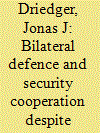

|
|
|
|
|
| Summary/Abstract |
With wavering US support and Brexit unfolding, cooperation between Germany, the EU's economic powerhouse, and the United Kingdom, Western Europe's prime military power, becomes crucial for Europe's overall ability to deal with a resurgent Russia. Does institutional and normative disintegration between states, such as the Brexit process, weaken bilateral security cooperation? This article argues that such cooperation persists if both states continue to jointly perceive a third actor as threatening while regarding each other as useful and reliable when it comes to ameliorating this shared threat. The argument is tested on a case of intrinsic theoretical, historical, and political importance: British-German cooperation towards Russia before and after the 2016 Brexit referendum. The article finds, against a wide pessimist consensus to the contrary, that cooperation strengthened during the Brexit process. As the Ukraine crisis had caused converging threat perceptions since 2014, Brexit incentivised both sides to signal ongoing reliability to each other and, consequently, to view each other as more capable allies. The article combines qualitative comparisons and congruence analysis, drawing data from British, German and Russian primary sources in their respective original languages, including foreign and security policy documents as well as interviews with stakeholders involved in policy formation.
|
|
|
|
|
|
|
|
|
|
|
|
|
|
|
|
| 15 |
ID:
145552
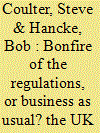

|
|
|
|
|
| Summary/Abstract |
Employment and labour market regulation initially appeared as one of the solid red lines in the UK's renegotiation of the country's place in the EU. The basic argument is that the UK's more deregulated labour market would sit uneasily in the more organised models, based on statutory instruments or collective bargaining, found on the continent. While there is a legitimate problem here, EU employment regulations appear manageable from the point of view of business, while unions see them as important tools for socially responsible economic restructuring. Most of UK employment case law is now deeply entangled with EU law; labour market regulations have, on the whole, become part of the way of doing business in the Single Market; and a simple cost–benefit analysis appears impossible because some costs are not quantifiable and the costs of others are reduced when taken as a bundle. Labour unions agree that transposition of European law needs to be done taking into account local sensitivities, while internationally oriented companies do not see EU regulations on the whole as detrimental to business. Importantly, though, the costs and benefits of EU employment regulations are not symmetrically distributed across different companies: large companies are better able to reap the rewards and accommodate the costs of operating in the Single Market than smaller companies.
|
|
|
|
|
|
|
|
|
|
|
|
|
|
|
|
| 16 |
ID:
144645
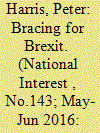

|
|
|
|
|
| Summary/Abstract |
TWENTY-FIVE years ago, Sir Geoffrey Howe resigned as deputy prime minister of the United Kingdom in protest of Margaret Thatcher’s staunch anti-Europeanism. Howe’s departure from the frontbenches came just two days after Thatcher’s denunciation in Parliament of plans for a European single currency (“No! No! No!”), a moment that has since become totemic of what Howe condemned in his resignation speech as the prime minister’s alacrity to undermine her own ministers over European issues.
|
|
|
|
|
|
|
|
|
|
|
|
|
|
|
|
| 17 |
ID:
148464
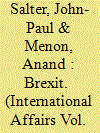

|
|
|
|
|
| Summary/Abstract |
Even though the opinion polling before the British referendum on membership of the European Union showed a narrow gap between the two sides, the actual result—a vote to leave—on the morning of 24 June 2016 came as a surprise to many. Yet in truth both the referendum and its outcome had deep roots in British politics. In this article we cast an eye over the history of Britain's relationship with the EU, which has long been marked by a mixture of awkwardness and successful influence. We trace the origins of the referendum in long-run tensions between, and within, the political parties, and in the lukewarm public support for European integration. We also examine more contingent, short-term factors relating to the referendum campaign itself. We conclude by commenting on the divisions exposed by the vote along lines of geography, education, class and wealth, and suggest that reconciling these with the continuing tensions in the party landscape make a clean and speedy exit from the EU unlikely.
|
|
|
|
|
|
|
|
|
|
|
|
|
|
|
|
| 18 |
ID:
154056
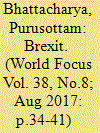

|
|
|
|
|
| Summary/Abstract |
Britain’s relationship with the European Union has always been problematic - prior to its entry into the EU in 1973 as well as during its 43 year membership. However the process of its disengagement from the EU, post June 2016, is technically so complex that the negotiation, just begun, have assumed a polemical overtone. A botched snap election gamble it by the British Prime Minister has added to the confusion.
|
|
|
|
|
|
|
|
|
|
|
|
|
|
|
|
| 19 |
ID:
156329
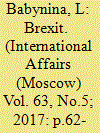

|
|
|
|
|
| Summary/Abstract |
IN JUNE 2016, Eurosceptics won the referendum on the UK's membership in the European Union. In March 2017, UK Prime Minister Theresa May notified Donald Tusk, President of the European Council, that Great Britain intended to leave the EU; this triggered Article 50 of the Lisbon Treaty. The British government needed nine months to formulate its vision of the future relations with the EU and outline the parameters of withdrawal. British proposals, however, multiplied questions rather than provided answers. The EU leaders, on the other hand, have their own ideas about the conditions, on which the UK will be allowed to quit. The sides' initial positions differ to the extent that the road toward a compromise looks difficult, not to say tortuous.
|
|
|
|
|
|
|
|
|
|
|
|
|
|
|
|
| 20 |
ID:
150186
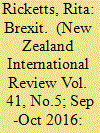

|
|
|
|
|
|
|
|